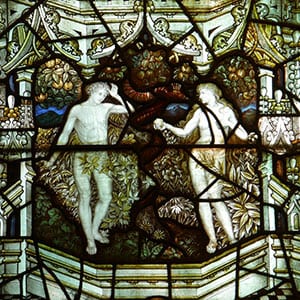We don’t know if God evolved, but belief did
By ucyprlc, on 21 January 2015
Written by Rebecca Caygill, Media Relations Manager
How and when did organised religion begin? It’s a big question and one that Professor Steve Jones (UCL Genetics, Evolution and Environment) set out to answer before a packed Darwin Lecture Theatre last week in his Lunch Hour Lecture, ‘Did God evolve?’, on 20 January.
After clarifying that he didn’t actually know if God evolved, Professor Jones spoke about where religion began and where science predicts it is heading, based on evidence. Starting with farming, he took us on an enlightening and amusing trip through the history of the evolution of religion.
Evidence for the link between religion and farming goes back thousand of years not only in fertility rites for crops, but also to the story of Adam and Eve who were expelled from Eden to “till the ground”.
From studying maps of the Holy Land overlaid with modern locations, there may be truth in biblical texts about places such as the Land of Nod, where scientists have found farming originated with pigs, sheep, cattle and goats.
With farming came an explosion in the population, which moved to the east and west, changing language along the way. Language is constantly evolving at the same rate – to notice changes within our own lifetimes, we only need to listen to old TV or radio recordings.
Knowing this, scientists traced the history of different languages and found the oldest to be Anatolian, dating back about 8,000 years. They found this language to originate in the same place where farming began, not too far from the city of Babel and close to the world’s oldest temple – Göbekli Tepe – which is more than 11,000 years old.
Professor Jones explained that with increased farming and rising numbers of people, the structure of societies changed. Hunter-gatherer communities were equitable and operated in small groups – they were unlikely to see as many people in their lifetime as we do between lectures!
Evidence of sophisticated societies started to emerge, lead by wealthy, strong rulers protected by defensive city walls. All this equated to a new inequality.
The move from foragers to herders also brought about a change in the kinds of gods that people believed in. Professor Jones highlighted three categories of gods used by researchers to gauge the changes: all-powerful; distant but not bothered, and intermediate, i.e. could interfere but don’t.
With the rise of secular power and the increase in population density, the percentage of people believing in active and moral gods escalated, suggesting religion was used to maintain society through a hierarchy. Indeed, research shows that, generally, the more equal and ‘successful’ a society is, the lower the belief in God, leading some to think that religion acts to maintain inequality.
Professor Jones then discussed the relationship between religion and demography, explaining that the more religious a country is, the more children believers will have on average. In the UK, there are more agnostics than Christians and birth rates have stabilised, but this is not a trend worldwide.
Take the Amish community in the USA for example – the population was 1,000 in 1900, but if the current rate continues at an average of six children per couple, their number is set to equal that of the US population by 2100, making them a dominant religion.
Although population growth has generally slowed in Christian countries, the religion itself is set to boom. Many parts of the world have experienced a speedy transition from high birth and death rates to low birth and death rates, with the exception of sub-Saharan Africa where couples have seven or eight children on average.
By 2050, scientists expect a quarter of the global population will be African and with this, the number of Christians will reach levels comparable to medieval times. In this way, science may be able to predict the future of religion by pattern of life and death.
As Professor Jones concluded, “If religion triumphs, it will be for biological reasons.”
 Close
Close


